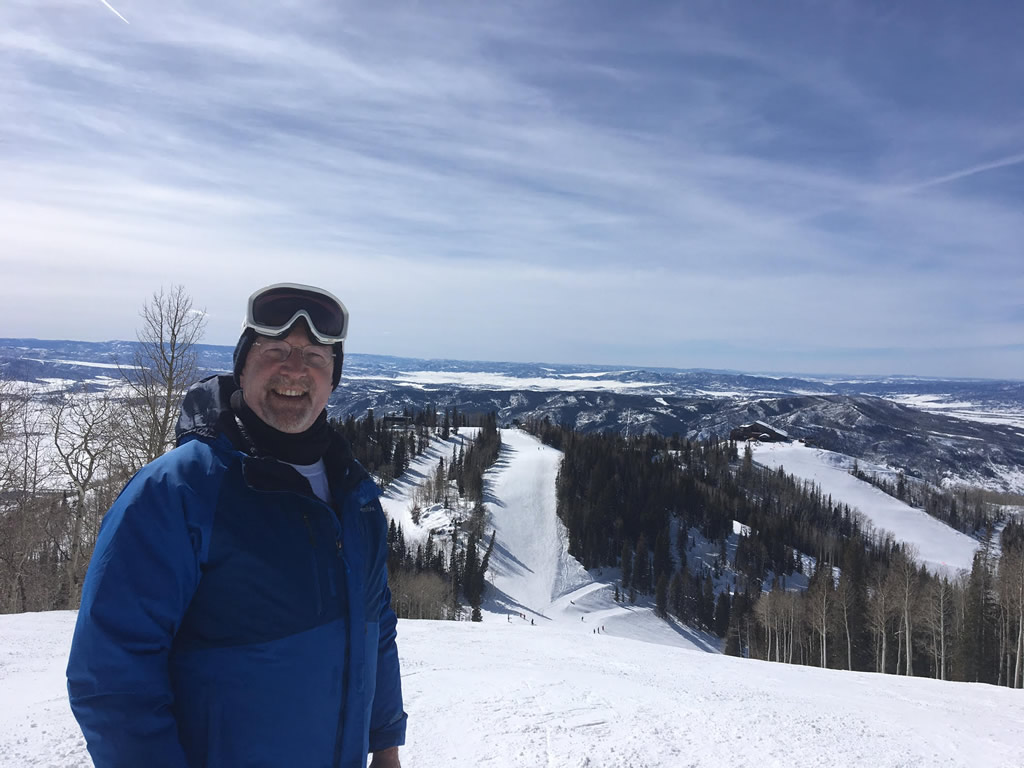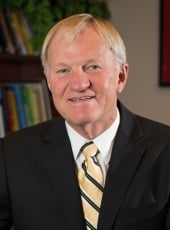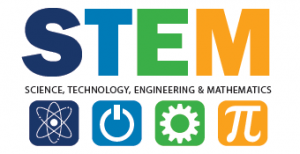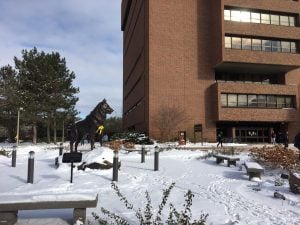
Even department chairs get to take a break every once in a while. Here is a photo taken on Thursday, March 8, on the slopes of Steamboat ski resort in Steamboat Springs, Colorado. This is my second time at this resort – the first time was last year – and I just love it.
One of the things in my personal life that I enjoy most about moving to Houghton some ten years ago is that it has rekindled in me an appreciation for outdoor winter sports. I wouldn’t be able to do what I am doing at Steamboat if it weren’t for our little ski hill in Houghton, Mont Ripley, which is owned and run by Michigan Tech. It is only 450 feet vertical and has two chair lifts and a T-bar, but the lake effect snow we get is every bit as good as what you will find in the big resorts out west. What it lacks in size it makes up for in convenience. I can go over on the weekends or after work and practice my technique (which still needs a lot of work) or just have fun. I started going my second year at Tech, first with rental equipment, then buying my own inexpensive gear at a ski swap, and later getting even better equipment as the years went by and it became obvious to my family how much I was enjoying it. This year I even took lessons from ski instructor Dan Dalquist, who is terrific and helped me a lot. So, kudos to Nick Sirdenis and his whole crew over at Mont Ripley: you do a great job and help make Michigan Tech the unique place that it is. Keep up the good work!
– Dan
Daniel R. Fuhrmann
Dave House Professor and Chair
Department of Electrical and Computer Engineering
Michigan Technological University
 I am delighted and excited to announce the launch of a new venture in the Department of Electrical and Computer Engineering at Michigan Tech. In September 2018, the ECE Department, in partnership with the online education support company
I am delighted and excited to announce the launch of a new venture in the Department of Electrical and Computer Engineering at Michigan Tech. In September 2018, the ECE Department, in partnership with the online education support company  Last week I made a short trip down to SW Michigan, to visit some of our industrial partners, and to pay visits to some old friends and new colleagues. It was my first time in that part of the state and I enjoyed it thoroughly.
Last week I made a short trip down to SW Michigan, to visit some of our industrial partners, and to pay visits to some old friends and new colleagues. It was my first time in that part of the state and I enjoyed it thoroughly. My automobile experience was only one of several times on this trip when I was reminded about the opportunities for electrical engineers in the area of controls. The industrial partners I visited confirmed for me what I have seen and heard many times before at Career Fair and with our External Advisory Committee, that automation is everywhere and that electrical engineers who have controls expertise are in high demand. This is one of the reasons we took our controls course in the EE curriculum, moved it to the junior level, and made it a required course. This is a good time to be studying electrical engineering and entering the job market, and graduates who can claim some expertise and experience with control systems will find many more doors opening up.
My automobile experience was only one of several times on this trip when I was reminded about the opportunities for electrical engineers in the area of controls. The industrial partners I visited confirmed for me what I have seen and heard many times before at Career Fair and with our External Advisory Committee, that automation is everywhere and that electrical engineers who have controls expertise are in high demand. This is one of the reasons we took our controls course in the EE curriculum, moved it to the junior level, and made it a required course. This is a good time to be studying electrical engineering and entering the job market, and graduates who can claim some expertise and experience with control systems will find many more doors opening up.

 One of the widespread truisms found throughout current thought on management and organizations is that silos are really horrible and that we have to do everything we can to break them down. Just Google the term “silos” and see what I mean. The term refers to vertically integrated units within a larger organization that keep to themselves, do not communicate or play well with others, and in some cases actually compete with other similar units. They are blamed for all manner of organizational ills such as inefficiency, lack of innovation, and resistance to change. When I think about this mindset I envision Dana Carvey’s impression of George H. W. Bush on Saturday Night Live years ago saying “silos…bad…baaad…”
One of the widespread truisms found throughout current thought on management and organizations is that silos are really horrible and that we have to do everything we can to break them down. Just Google the term “silos” and see what I mean. The term refers to vertically integrated units within a larger organization that keep to themselves, do not communicate or play well with others, and in some cases actually compete with other similar units. They are blamed for all manner of organizational ills such as inefficiency, lack of innovation, and resistance to change. When I think about this mindset I envision Dana Carvey’s impression of George H. W. Bush on Saturday Night Live years ago saying “silos…bad…baaad…” Read just about any description of research activity in the United States today, say from the National Science Foundation, and you are sure to find something about the importance of multidisciplinary or interdisciplinary work. The idea that people need to work together in teams and across traditional boundaries has become dogma in research communities, and casting one’s work in an interdisciplinary light has become all but required for obtaining research funding. Of course, I am all for people working together in teams when that makes sense, and for not letting boundaries get in the way of good work and collaboration. But, the emphasis on interdisciplinary work that has become so prevalent in recent years has gotten me to wonder – what makes an academic discipline, anyway? And who gets to decide?
Read just about any description of research activity in the United States today, say from the National Science Foundation, and you are sure to find something about the importance of multidisciplinary or interdisciplinary work. The idea that people need to work together in teams and across traditional boundaries has become dogma in research communities, and casting one’s work in an interdisciplinary light has become all but required for obtaining research funding. Of course, I am all for people working together in teams when that makes sense, and for not letting boundaries get in the way of good work and collaboration. But, the emphasis on interdisciplinary work that has become so prevalent in recent years has gotten me to wonder – what makes an academic discipline, anyway? And who gets to decide? This week I want to follow up on my column from two weeks ago, before Thanksgiving, on the various ways that we use the words associated with my line of work: science, computing, engineering, technology, and mathematics. This is mostly a random collection of observations on the strange ways that we use these words, without a whole lot of practical solutions. Think of it as the grammar maven (see FWF 06/16/2017) meeting the engineering professor.
This week I want to follow up on my column from two weeks ago, before Thanksgiving, on the various ways that we use the words associated with my line of work: science, computing, engineering, technology, and mathematics. This is mostly a random collection of observations on the strange ways that we use these words, without a whole lot of practical solutions. Think of it as the grammar maven (see FWF 06/16/2017) meeting the engineering professor.
 A couple of weeks ago I reported with barely contained glee that winter was on its way. I was right. We got a few inches of additional snow this past week, and for the time being it is sticking around. Thursday night temperatures plunged into the single digits in the western part of the Upper Peninsula. The cross-country ski trails at Michigan Tech are open, and I plan to be out there on Saturday. It’s a good time to make sure I have all the right gear, or at least remember where I put it at the end of the season last year. It’s nice to have the ski season start a little early for a change.
A couple of weeks ago I reported with barely contained glee that winter was on its way. I was right. We got a few inches of additional snow this past week, and for the time being it is sticking around. Thursday night temperatures plunged into the single digits in the western part of the Upper Peninsula. The cross-country ski trails at Michigan Tech are open, and I plan to be out there on Saturday. It’s a good time to make sure I have all the right gear, or at least remember where I put it at the end of the season last year. It’s nice to have the ski season start a little early for a change.